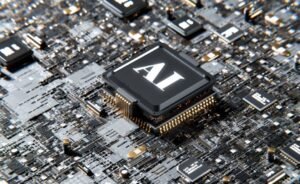Artificial Intelligence and Software Engineering
Artificial Intelligence (AI) and Software Engineering have become increasingly intertwined in recent years, revolutionizing how software is developed, tested, and maintained. AI techniques and algorithms are being leveraged to automate various aspects of the software engineering process, resulting in improved efficiency, accuracy, and innovation.
Key Takeaways:
- Artificial Intelligence and Software Engineering are intersecting fields that are transforming software development.
- AI is enhancing software engineering processes, enabling automation and improving efficiency.
- The integration of AI in software engineering is leading to faster development cycles and increased software quality.
AI in Software Engineering
AI is playing a crucial role in different stages of the software engineering lifecycle. During the requirements gathering phase, AI techniques can analyze natural language inputs and help in understanding and documenting user requirements more accurately and efficiently. In the design phase, AI can assist in generating code skeletons, improving design decisions, and identifying potential design flaws.
When it comes to testing and debugging, AI can be used to automatically generate test cases, detect and fix bugs, and optimize software performance. By leveraging machine learning, AI algorithms can learn from large codebases to identify patterns and predict possible errors, leading to improved software quality and reduced maintenance efforts. Additionally, AI-powered tools can aid in automatically documenting software changes and updates.
The integration of AI in software maintenance processes offers benefits such as intelligent bug tracking and resolution, automatic code refactoring, and even predicting maintenance needs based on historical data. These AI-driven maintenance practices result in faster response times, lower costs, and improved software resilience.
AI and Software Engineering Challenges
While the benefits of using AI in software engineering are undeniable, challenges also arise. The scarcity of quality training datasets poses a significant challenge for AI algorithms. Acquiring and labeling large datasets can be time-consuming and expensive. Furthermore, AI models may lack interpretability, making it difficult to trust the decisions made by these algorithms. Striking a balance between automation and human intervention in the software engineering process is key to addressing these challenges and ensuring the success of AI integration.
Tables
| Stage of Software Engineering Lifecycle | AI Applications |
|---|---|
| Requirements Gathering | Natural language processing, sentiment analysis, and data modeling |
| Design | Code generation, design improvements, and flaw detection |
| Testing and Debugging | Automated test case generation, bug detection, and performance optimization |
| Maintenance | Bug tracking and resolution, predictive maintenance, and code refactoring |
| Improved Efficiency | Increased Software Quality | Faster Development Cycles |
|---|---|---|
| Automated tasks reduce manual effort | AI-powered error detection and prevention | Avoidance of time-consuming manual processes |
| Efficient code generation and optimization | Faster bug tracking and resolution | Accelerated software deployment |
| Quick identification of design flaws | Improved software maintainability | Enhanced agility in adapting to changes |
| Scarcity of Quality Training Datasets | Model Interpretability | Automation vs. Human Intervention |
|---|---|---|
| Time-consuming and expensive data acquisition and labeling | Difficulty in explaining AI algorithms’ decisions | Necessity to find the right balance between automation and human expertise |
| Limited availability of diverse and representative datasets | Trust in algorithmic decision-making | Ensuring human supervision and accountability |
| Privacy concerns and ethical considerations in data collection | Ensuring fairness and preventing bias in AI systems | Integration of human feedback in AI-enabled processes |
Future of AI in Software Engineering
The future of AI in software engineering is promising. As AI algorithms continue to advance, their capacity to learn and improve will play a pivotal role in shaping the future of software development. With the rise of autonomous systems, AI will contribute to intelligent decision-making, self-healing software, and proactive bug prevention. Additionally, the combination of AI and big data analytics will unlock new opportunities for software engineers to gain insights and make data-driven decisions.
Moreover, the collaborative nature of AI and software engineering will become more prevalent, allowing for seamless integration between human developers and AI-driven tools and platforms. This collaboration will foster innovation, improve productivity, and empower software engineers to focus on higher-level tasks that require human creativity and ingenuity.
As we look ahead, the fusion of AI and Software Engineering will shape the future of software development, enabling faster, smarter, and more efficient solutions. The potential for AI to revolutionize the industry is immense, and its impact will continue to grow as technology advances.

Common Misconceptions
Misconception 1: Artificial Intelligence (AI) will replace all human jobs
One common misconception about AI is that it will completely replace human jobs, leading to mass unemployment. However, this is not entirely true. While AI technology can automate certain tasks and make them more efficient, it does not possess the ability to fully replace the human workforce. Here are a few points to consider:
- AI technology can complement human work by automating repetitive tasks and freeing up time for more complex tasks that require creative thinking and decision-making skills.
- AI often requires human supervision and intervention to ensure accuracy and provide context to its decision-making process.
- New job roles and industries will emerge as a result of AI integration, creating opportunities for professionals with skills in AI development and implementation.
Misconception 2: AI is only beneficial for large tech companies
Another misconception is that AI is only beneficial for large tech companies and is not relevant to other industries. In reality, AI has the potential to benefit a wide range of sectors and organizations. Here are a few important points to note:
- AI technology can enhance efficiency and productivity in industries like healthcare, finance, manufacturing, and transportation.
- Small businesses can leverage AI tools to automate processes, personalize customer experiences, and gain insights from large datasets.
- AI can be used to address societal challenges, such as improving access to education, healthcare, and renewable energy.
Misconception 3: Software engineering is no longer relevant in the age of AI
Some people believe that AI advancements will make software engineering obsolete. However, this is far from the truth. Software engineering remains vital in developing and maintaining AI systems. Here’s why:
- Software engineers are responsible for building the infrastructure that supports AI applications and ensuring their reliability, scalability, and security.
- They play a crucial role in data collection, cleansing, and preparation, which is essential for training AI models.
- Software engineers collaborate with data scientists and AI experts to integrate AI components into existing systems and optimize their performance.

Artificial Intelligence and Software Engineering
Artificial Intelligence (AI) and software engineering are two disciplines that have revolutionized various industries, from healthcare to finance. This article explores some fascinating aspects of the intersection between AI and software engineering, shedding light on their applications and impact.
The Rise of AI in Software Engineering
AI has significantly transformed software engineering, enabling developers to automate processes, improve code quality, and enhance overall productivity. The following table highlights statistics on the adoption and impact of AI in software engineering:
Applications of AI in Software Engineering
AI is employed in numerous ways within the field of software engineering. The table below illustrates some notable applications and their corresponding benefits:
Key AI Technologies in Software Engineering
Software engineering leverages various AI technologies that advance the efficacy of development processes. The subsequent table outlines some key AI technologies and their capabilities:
Benefits and Challenges of AI in Software Engineering
While AI brings numerous advantages to software engineering, it also presents challenges that need to be addressed. The table below demonstrates the benefits and challenges associated with AI implementation in this domain:
AI and Software Testing
AI has revolutionized software testing practices, facilitating more efficient and robust testing procedures. The subsequent table showcases statistics related to AI’s impact on software testing:
AI-Powered Bug Detection Tools
Developers rely on AI-powered bug detection tools to identify and resolve software flaws promptly. The table below presents a selection of top AI-powered bug detection tools:
AI and Code Generation
AI technologies have also made significant advancements in generating code automatically or assisting developers in code generation. The following table highlights the correlations between AI and code generation:
AI in Software Deployment and Monitoring
AI empowers software deployment and monitoring processes, ensuring optimized performance and user experience. The subsequent table explores the applications of AI in software deployment and monitoring:
AI and Agile Development
The Agile development methodology has integrated AI capabilities to enhance collaboration, automation, and project management. The table below showcases some aspects linking AI and Agile development:
The Future of AI in Software Engineering
The future of AI in software engineering appears promising, with continuous advancements enhancing development practices. The following table provides insights into the potential future trajectory of AI in this field:
In conclusion, the marriage of artificial intelligence and software engineering has revolutionized the development landscape, improving efficiency, accuracy, and innovation. AI’s integration in various stages of the software development lifecycle has opened new horizons, enabling developers to achieve greater heights of success with each iteration.
Frequently Asked Questions
What is artificial intelligence?
Artificial intelligence (AI) is a branch of computer science that focuses on creating intelligent machines capable of simulating human-like behavior and performing tasks that would typically require human intelligence, such as problem-solving, learning, and decision-making.
How does artificial intelligence relate to software engineering?
Artificial intelligence and software engineering are closely related fields. Software engineering encompasses the development and maintenance of software systems, while artificial intelligence involves designing and implementing intelligent algorithms and systems within software applications.
What are the main goals of software engineering?
The main goals of software engineering include creating high-quality software that meets user requirements, ensuring the software is reliable and maintainable, and optimizing the software development process to be efficient and cost-effective.
How is artificial intelligence used in software development?
Artificial intelligence is used in software development to enhance various aspects of the software, such as intelligent automation, natural language processing, data analysis and prediction, and computer vision. AI techniques and algorithms can improve the functionality, performance, and user experience of software applications.
What programming languages are commonly used in artificial intelligence and software engineering?
Common programming languages used in artificial intelligence and software engineering include Python, Java, C++, and R. These languages offer libraries and frameworks that support AI and software development, making them popular choices among developers.
What are some examples of artificial intelligence applications in software engineering?
Some examples of artificial intelligence applications in software engineering include automated bug detection and fixing, code generation, code optimization, intelligent code refactoring, and intelligent software testing. These applications aim to improve the efficiency and reliability of software development processes.
What are the ethical considerations surrounding artificial intelligence in software engineering?
Ethical considerations surrounding artificial intelligence in software engineering include issues such as algorithmic bias, privacy concerns, job displacement, and the responsible use of AI technology. It is important to address these ethical concerns to ensure that AI-powered software systems benefit society without causing harm.
What are the future trends in artificial intelligence and software engineering?
Future trends in artificial intelligence and software engineering include the increased use of machine learning and deep learning algorithms, the integration of AI into various industries, the development of AI-powered autonomous systems, and the advancements in natural language processing and computer vision technologies.
What skills are required to work in the field of artificial intelligence and software engineering?
Skills required to work in the field of artificial intelligence and software engineering include a strong understanding of programming languages, algorithms, and data structures, knowledge of AI concepts and techniques, analytical and problem-solving abilities, and the ability to work collaboratively in a team.
How can I learn more about artificial intelligence and software engineering?
To learn more about artificial intelligence and software engineering, you can explore online resources such as tutorials, courses, and research papers. Additionally, participating in AI and software engineering communities and attending conferences and workshops can provide valuable insights and networking opportunities.





